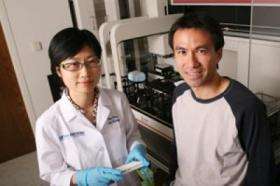Researchers disrupt biochemical system involved in cancer, degenerative disease

Screening a chemical library of 200,000 compounds, researchers at UT Southwestern Medical Center have identified two new classes that can be used to study and possibly manipulate a cellular pathway involved in many types of cancer and degenerative diseases.
"The identification of these chemicals and their targets within this cellular pathway represents an important step in developing therapeutic agents," said Dr. Lawrence Lum, assistant professor of cell biology and senior author of the study, available at Nature Chemical Biology.
The researchers studied biochemical reactions within cells controlled by a class of proteins called Wnt (pronounced "wint"). Wnt proteins help control embryonic development in many animals, including humans. In adults, these proteins also sustain the vital supply of stem cells that replenish various body tissues. Misregulation of cellular responses to Wnt proteins, however, is associated with a broad range of diseases including Alzheimer's and polycystic kidney disease, cancer and type 2 diabetes.
In the current study, the researchers used cultured mouse cells that were engineered to glow green when Wnt-controlled pathways were active. A robotic device then tested 200,000 compounds to measure their effects on the cells.
Nine compounds that inactivated Wnt-controlled systems - thus preventing the cells from glowing - were earmarked for further research. The researchers then found that five of these compounds stopped cells from responding to Wnt, and four prevented Wnt from being produced in the first place.
"The ability to attack this disease pathway at two distinct regulatory steps is an important step toward realizing personalized medicine that aims to tailor the use of drugs for specific genetic mutations," Dr. Lum said.
Importantly, the action of these compounds is reversible, the researchers found. "This may allow us to target diseased cells without permanently altering the function of normal stem cells," Dr. Lum said.
Despite these encouraging results, there is a long way to go before these compounds could be the basis of new drugs, Dr. Lum said. The researchers plan to make variations of these compounds to see if they can be effective at lower doses, and they also will perform additional studies in whole animals, he said.
Source: UT Southwestern Medical Center

















